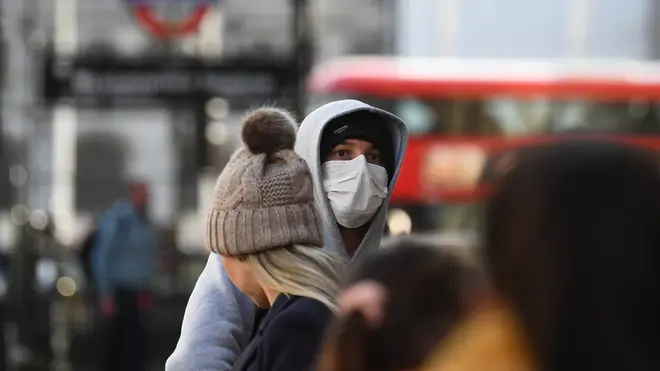
Tom Swarbrick 4pm - 6pm
4 March 2020, 10:12

WIth concerns over the coronavirus outbreak rising LBC News asked an expert what the symptoms are and how you can protect yourself against catching the virus.
England's Chief Medical OfficerChris Whitty said it was "likely" but not definite that the spread of the coronavirus would become an epidemic in the UK.
"At this point in time we think it is likely, not definite, that we will move into onward transmission and an epidemic here in the UK," he said.
With concerns over the spread of the Covid-19 virus at the forefront of the nation's mind, LBC News asked one infectious disease expert about the outbreak
Read more: Coronavirus UK: Do surgical face masks work to avoid virus symptoms?
Dr Jonas Nilsen, MD and co-founder of Practio, a travel vaccination and infectious disease advice service, said it’s important to know that the coronavirus can be asymptomatic, which means that not everyone will experience symptoms.
Dr Nilsen said most people who become infected with coronavirus will experience fever, tiredness and a dry cough.
He said some people could experience body aches, a blocked or runny nose, a sore throat and in some cases diarrhoea.
The disease expert said around 1 out of 6 people who become infected with coronavirus experience more serious symptoms such as breathing difficulties.
He added it is important to know that the coronavirus can be asymptomatic, which means that not everyone will experience symptoms.
Read more: Coronavirus: What is a pandemic and how is one declared?
When it comes to fever, Dr Neilsen said it is difficult to describe what a coronavirus fever would like, since this is very individual.
"Some may experience a high fever, some may have a slight fever, hardly noticeable, while others may not have a fever at all. For the same reason, it is difficult to say when you should be concerned."
He advised people to call NHS 111 if they think they are showing symptoms of coronavirus. They will be able to assess whether you need medical help and provide advice on what to do.
He warned that coronavirus has an incubation period of 1 to 14 days, most commonly 5 days. This means that the symptoms most often develop over a few days, including the cough.
He told LBC News there is still limited information on the type of damage that the coronavirus has on the lungs, so it’s difficult to compare it up against other conditions.
"There are several reasons why you can experience a shortness of breath. Shortness of breath (dyspnea) is the feeling of being short-breathed (ie, breathless), that is, an unpleasant experience of getting too little air. However, it is normal to be out of breath when exercising physically."
Read more: Family self-isolated due to 'people’s fears' over coronavirus
Government advice has been to wash your hands for at least 20 seconds, but many people have been buying hand sanitiser, the doctor said washing your hands with soap and water is the best way to remove bacterias and viruses.
However, if soap and water are not available, you can use an alcohol-based hand sanitiser.
He said it was important that the sanitiser contains at least 60% alcohol, but you should know that sanitisers do not remove all types of bacteria and viruses, and they are not very effective if your hands are visibly dirty or greasy.
He warned hand sanitiser should not replace soap and water.